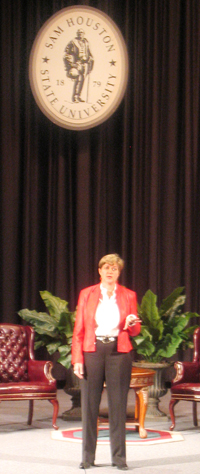Enron 'Emperor' Didn't Know He Was On The Titanic
 |
| With Gen. Sam Houston literally hanging
around in the background, Enron whistleblower Sherron
Watkins said that Sam had it right when he advised "...do
right and fear not..." |
“It really, truly felt like I was on the Titanic, witnessing
it sinking,” former vice president of the Enron Corporation
Sherron S. Watkins said of the company’s decline in
2001.
Watkins, dubbed by the media as Enron’s “whistleblower”
for alerting then-chief executive officer Ken Lay to the accounting
irregularities within the company, discussed the corporation’s
deterioration and advised students of warning signs of unethical
future employers during the President’s Speaker Series
lecture on Tuesday morning.
From an insider’s perspective, Watkins likened Lay to
the naked emperor from the Hans Christian Andersen fairy tale
“The Emperor’s New Clothes.” In the story,
the emperor was convinced by two swindlers into being dressed
in a special cloth invisible to anyone who was either stupid
or not fit for his position.
Jeff Skilling, an Enron CEO, and Andy Fastow, a chief financial
officer, were like the swindlers, creating financial structures
that were like the cloth: it really wasn’t there, according
to Watkins.
“The emperor, like Ken Lay, was too focused on his outward
appearance, too focused on his next set of good clothes, and
he’s really not paying attention to his empire,”
she said. “Ken Lay was never looking at the details
of Enron. He was always the outward face, looking at internationally
what we were doing, bringing power or natural gas to developing
countries. He was very much involved in politics, very much
involved in the public face of the company, but never looking
at the details.
“As a result, he became the ultimate victim of the swindlers,”
Watkins said, adding that the building pressure of people
lying about understanding the “cloth”—the
financial structures—escalated to the point of fraud.
The financial structures created by Skilling and Fastow were
so complex that it took two executives three hours to try
to explain the structures to Watkins, she said. Such explanations
usually ended with a comment to the effect of the auditing
company said it was OK.
“Smart people who couldn’t get the right answers
just stopped asking questions,” she said. “People
were hesitant to say anything because once you said that it
might be OK, once you go along with it, it’s really
hard to go back and say, ‘you know what, emperor, I
never saw clothes.’
“People wouldn’t understand these structures;
they would just go along with them, and once their flaws were
really apparent, they were down the wrong path,” she
said.
When she first came to the realization of these flaws, Watkins
said she began looking for a new job.
It was only when Skilling “jumped ship” (quit)
that she realized her concerns were much worse than she had
initially thought and went to inform the emperor that “he
was naked.”
The results for the company once lauded for its innovation
by such entities as Harvard and Darden, Fortune magazine (which
named Enron the “Most Innovative Company in America”
for seven years in a row) and BusinessWeek have been devastating.
Some 7,000-8,000 people in Houston lost their jobs with no
severance pay, $6 billion was lost by shareholders and $60
billion was owed to creditors, who reclaimed 25 cents for
every dollar actually owed.
Watkins warned students that the Enron scandal started with
the rationalization that what they were doing wasn’t
breaking the law, the propensity for which is one thing they
should look out for in their future jobs.
“Fifty percent of white collar criminals go to prison
able to pass a lie detector test that they did nothing wrong,”
she said. “Why? What hinges on white collar crimes is
the rationalization that what they are doing is not technically
breaking the law.”
She told students to judge their ethics by the three
M test--mentor, media, and
mother. If you would be embarrassed if any of them found
out or knew what you were doing, don't do it.
She also referred to a comment attributed to Gen. Sam Houston
in 1855, when he said he was going to give a speech, even
though he knew it would be unpopular, because he believed
it best to "...do right and fear not..."
“If you’re not honest, you’re going to have
fear in your life, and you won’t be able to make a stand
that you want to later in life,” she said. “I
could go to Ken Lay because I knew my expense reports were
squeaky clean.
“I am certain that he (Lay) had a team look through
my eight years of expense reports to see if they could find
something funny and fire me for cause (stealing from the company
through expense reports),” Watkins said. “If you
are not always honest, there may come a point in time in your
lives when you want to make a stand for what is right, but
you are filled with fear that you are going to be caught for
some other infraction that you have done. You must always
be honest so that you can be fearless.”
Finally, she told students if their value systems were challenged
routinely or if they do not have a zero tolerance policy
for ethically-challenged employees, get out of the job, because
it can only cause problems later down the road.
—END—
SHSU Media Contact: Jennifer
Gauntt
Nov. 15, 2006
Please send comments, corrections, news tips to Today@Sam.edu.
|


